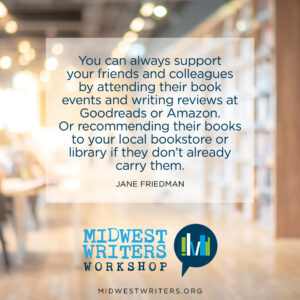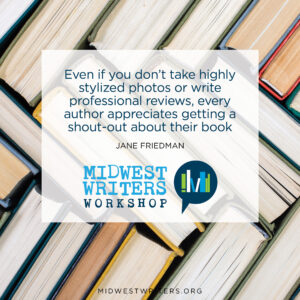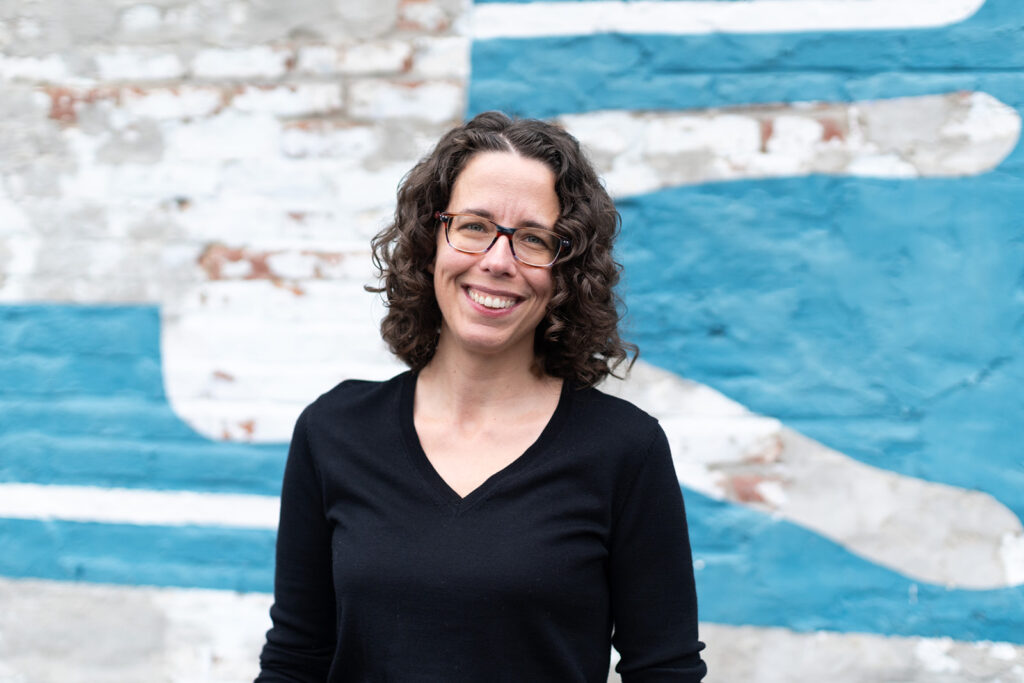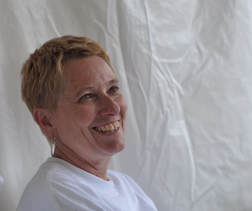 Jane Friedman has has spent nearly 25 years working in the book publishing industry, with a focus on author education and trend reporting. She is the editor of The Hot Sheet, the essential publishing industry newsletter for authors, which was named 2020 Media Outlet of the Year by Digital Book World. Her latest book is The Business of Being a Writer (University of Chicago Press), which received a starred review from Library Journal. In addition to serving on grant panels for the National Endowment for the Arts and the Creative Work Fund, she works with organizations such as The Authors Guild to bring transparency to the business of publishing.
Jane Friedman has has spent nearly 25 years working in the book publishing industry, with a focus on author education and trend reporting. She is the editor of The Hot Sheet, the essential publishing industry newsletter for authors, which was named 2020 Media Outlet of the Year by Digital Book World. Her latest book is The Business of Being a Writer (University of Chicago Press), which received a starred review from Library Journal. In addition to serving on grant panels for the National Endowment for the Arts and the Creative Work Fund, she works with organizations such as The Authors Guild to bring transparency to the business of publishing.Learn more at JaneFriedman.com.
Q&A with Jane Friedman
 It’s always a thrill to pick Jane Friedman’s brain about all things publishing and platform. These questions surround the topic of her MWW23 Keynote speech: “Literary Citizenship: The Feel-Good Way to Market and Promote.” I hope the questions I had are some of the same ones you have, and there’s so many more! Register for our 50th anniversary conference this summer to hear more from Jane.
It’s always a thrill to pick Jane Friedman’s brain about all things publishing and platform. These questions surround the topic of her MWW23 Keynote speech: “Literary Citizenship: The Feel-Good Way to Market and Promote.” I hope the questions I had are some of the same ones you have, and there’s so many more! Register for our 50th anniversary conference this summer to hear more from Jane.
MWW: Many writers I know read a variety of genres, or know authors from across the board. (For instance, I prefer to write creative nonfiction but am friends with many comic book and horror authors.) How can we celebrate their work without drawing us away from our own genres and communities?
JF: Post on social media about their work! Or include a mention of them in your email newsletter, if you have one. Even if you don’t take highly stylized photos or write professional reviews, every author appreciates getting a shout-out about their book, and you probably have friends or followers who read across multiple genres. It takes nothing away from your own special community to celebrate a writer who’s outside of it. Plus no one expects your posts to be solely focused on your own genre. That said, if it doesn’t seem appropriate, you can always support your friends and colleagues by attending their book events and writing reviews at Goodreads or Amazon. Or recommending their books to your local bookstore or library if they don’t already carry them.
MWW: In The Business of Being a Writer, you explained that engaging with a community “means talking about stuff you care about.” I’ve seen authors who post frequently about political or potentially derisive topics. Do you find this puts readers off (even sometimes if they agree with the author’s standpoint), or would you advise people to tone down those strong opinions so as to not overshadow the work they’re doing (unless of course their work is related to that topic)? I guess I’m asking about an effective way to present an authentic online self vs. only talking about books.
JF: It’s a personal decision in the end, and only you can decide the right approach. I know there can be significant pressure from every side to take a public stand on socio-political issues, but it’s OK not to have an opinion on issues that you know little or nothing about! And in cases where you do have an informed opinion and/or a strong position, it’s also OK to keep those opinions private or for in-person conversations, where you’re most likely to encounter people who will engage with you in good faith. Probably not discussed enough: it’s OK to go online and focus on things that bring light or meaning into your life, rather than things that upset you. (And block things that don’t.) That’s not to say let’s all stick our head in the sand about important issues of the day, or pretend that what we say (or don’t say) doesn’t matter. Rather: we can choose how and where we want to make a difference. Engaging on social media especially about political issues or hot-button topics works for some people. But frankly, for many, it doesn’t—and that often leads to people silently logging off social media all together.
But to more directly answer your question: it helps to set some ground rules for yourself and decide what divisive topics you will or won’t discuss, and then be as consistent as possible in how and when you discuss them. Taking a stand on issues will bring as many readers to you as it drives away, so I wouldn’t worry about that part.
MWW: I once heard Brendan O’Meara of The Creative Nonfiction Podcast say that for every ten posts of someone else’s work, he’d include one of his own. What are your thoughts on the ratio of posting about others’ work versus your own? “Not enough” literary citizenship seems easy to achieve, but is there such thing as “too much”? We want to celebrate and promote our work, but how can we do so in in a tactful way without overloading our audience?
 JF: I’ve heard a lot of ratio suggestions over the years, and while I understand people want to be helpful by offering a structured approach, for me it’s too calculated. I don’t use social media in such a way that I’m thinking, “OK, this is my single post about me for the day, better make it a good one!” Or, “I have to post about six other authors before I can mention myself again.” I’d consider more the spirit of these rules and what they’re trying to help you see: that it helps to be curious and interested in other people, and that a relentless focus on what you want to sell/promote is generally a turn off.
JF: I’ve heard a lot of ratio suggestions over the years, and while I understand people want to be helpful by offering a structured approach, for me it’s too calculated. I don’t use social media in such a way that I’m thinking, “OK, this is my single post about me for the day, better make it a good one!” Or, “I have to post about six other authors before I can mention myself again.” I’d consider more the spirit of these rules and what they’re trying to help you see: that it helps to be curious and interested in other people, and that a relentless focus on what you want to sell/promote is generally a turn off.
There are many accounts I follow that are literally nothing more than the creator sharing their work, and that’s all I really want from that person. When they share their ideas and their work so freely, without asking me for anything in return, it is a gift. So then ask yourself: am I sharing something of value or that other people would value? Or am I just asking for a sale? If it’s mostly the latter, then it is time to think about those ratios.
MWW: While literary citizenship isn’t transactional—I heard you say once that it’s more like throwing a javelin than a boomerang (note to readers: Midwest Writers does not recommend throwing javelins at other authors)—there comes a point when we do need to make “The Big Ask” to a writer whose work we’ve promoted. Is there a guideline or “template,” if you will, for a successful Ask, perhaps one you’ve received or have heard others mention?
JF: Not a template, per se, but: Be brief and be specific. Some people worry about being abrupt or too direct when they ask a favor. But it’s such a blessing when someone knows what they want, they ask for it directly, and they don’t waste my time in doing it. They make it easy to say yes or no, without me having to ask a bunch of follow-up questions. If there were a template, it would go something like this: the first paragraph would establish who I am or remind the person who I am if there’s the slightest possibility they need to be reminded. (If there’s no doubt, then 1-2 sentences of small talk is fine. “Saw your latest Instagram post, how fun!”) Next paragraph is the ask. Final paragraph is the closing of about one sentence: I greatly appreciate your consideration. Add a deadline in the closing if there is one. If you’re tempted to send lots of information, add a link they can click on to learn more. Or say you can send over such-and-such if they want to know more.
See how easy and BRIEF that was? 🙂
MWW: In this blog post from 2014, you defended literary citizenship against the idea that it was part of the publishing industry’s plan to have authors do their marketing work for them. Have you found this school of thought to have gained any momentum, or have there been any other changes since then in the perception of literary citizenship?
JF: It has not gained momentum, thankfully. If there has been any change, I’d say that people are getting a little more strategic with their efforts, which isn’t necessarily a bad thing. But it’s possible to cross a line, like if you start asking other people to do things in the name of literary citizenship that are really just a favor to you or to your organization, especially if it’s activity or work that would ordinarily be paid for. Don’t use the cry of “literary citizenship” to take advantage of people’s goodwill.
They will help you write your story!
REGISTER NOW!
Exciting News!
MWW is dedicated to building a community where writers can network with others and grow.



